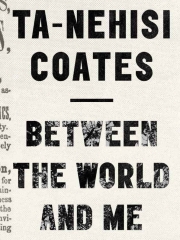Between the World and Me by Ta-Nehisi Coates
I’ve put off reading this book for a while, and there’s never been a better time to finally do it.
1) “Then she asked me about ‘hope.’ And I knew then that I had failed. And I remembered that I had expected to fail.”
Hope is not a strategy.
2) “Later, I would hear it in Dad’s voice – ‘Either I can beat him, or the police.'”
Looking back, the prevalence of child beating is seriously messed up but arguably effective.
3) “I remember sitting in my seventh-grade French class and not having any idea why I was there.”
I knew why I was there. For the Quebec trip.
4) “What any institution, or its agents, ‘intend’ for you is secondary.”
Intention, process, result. Which one of these is most important?
5) “These are the preferences of the universe itself: verbs over nouns, actions over states, struggle over hope.”
I don’t necessarily agree with this, but it’s well written.
6) “It is not necessary that you believe that the officer who choked Eric Garner set out that day to destroy a body. All you need to understand is that the officer carries with him the power of the American state and the weight of an American legacy, and they necessitate that of the bodies destroyed every year, some wild and disproportionate number of them will be black.”
This idea of the system really struck me with the death of Rayshard Brooks. The incident started so calmly and quickly devolved into chaos. It was a classic case of two people just trying to live their lives.
7) “And that right has always given them meaning, has always meant that there was someone down in the valley because a mountain is not a mountain if there is nothing below.”
If not race, some other dimension will serve as the discrimination tool. Wealth and education are obviously already long-established measuring sticks used to put others down. Sometimes I think those are just as, if not more, dangerous.
8) “The Dream seemed to be the pinnacle, then – to grow rich and live in one of those disconnected houses out in the country, in one of those small communities, one of those cul-de-sacs with its gently curving ways, where they staged teen movies and children built treehouses, and in that last lost year before college, teenagers made love in cars parked at the lake.”
This really crystallized a nebulous feeling I’ve had about the suburbs. More than anything, suburbs are defined by their avoidance of other people’s problems.
9) “At football games the other students would cheer the star black running back, and then when a black player on the other team got the ball, they’d yell, ‘Kill that nigger! Kill that nigger!'”
From my point of view, American entertainment is very disproportionately black. NBA. NFL. Music. Yet, besides the superstars, the people who make the most money from the system are not.
10) “But do not struggle for the Dreamers. Hope for them. Pray for them, if you are so moved.”
I was very disappointed that this was the last message in the book. I thought the whole point was that hope was not a strategy, but the ending had me feeling like there is nothing we can do except hope for other people to change their ways.
I look forward to his son’s reply letter.
